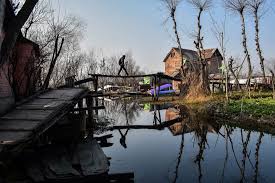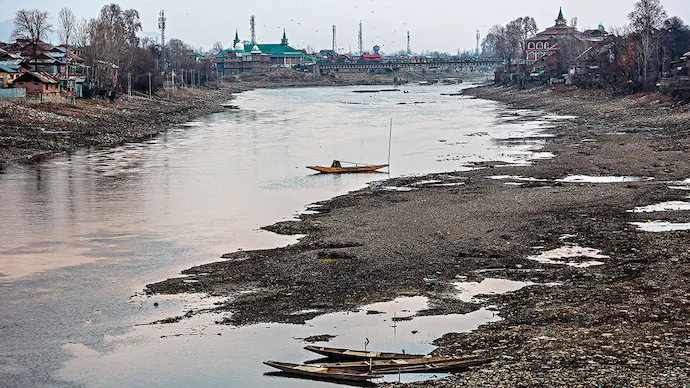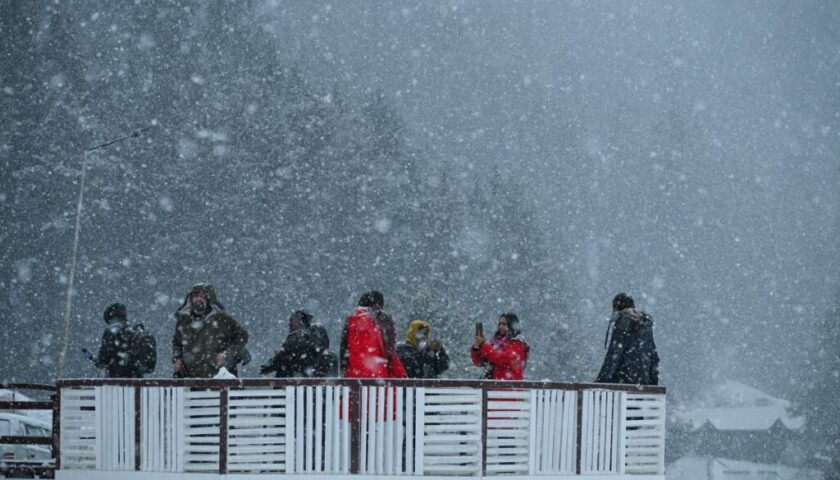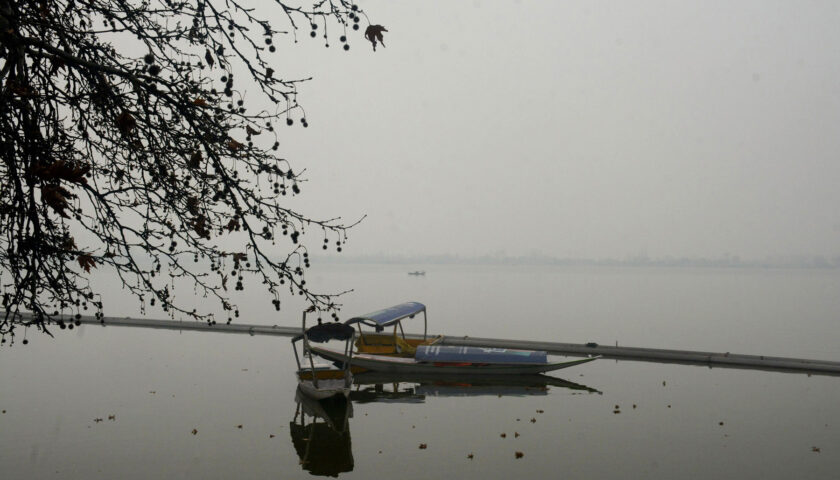Sitting near a shop in the interiors of Dal Lake, 65-year-old Abdul Rehman is old enough to remember a time when the lake’s water was clean enough to drink. Today, he gazes sadly at the highly degraded state of its water. “Even after filtering multiple times, this water will not be fit to drink,” he said.
Rehman now makes it a point to ask every tourist in a
Over the years, both state and Central government leaders have made umpteen promises and allocated hundreds of crores to clean up the Dal Lake. National Conference president Farooq Abdullah currently represents Srinagar in Parliament. The National Conference held the constituency the most number of years, but the Peoples Democratic Party claims it did nothing to stop the lake’s degradation.
“It was during the term of the Mehbooba Mufti-led government that the Centre sanctioned further funds to preserve the Dal Lake, but due to the fall of our government, we could not continue the work,” said Rafi Ahmad Mir, chief spokesperson for the Peoples Democratic Party.
While National Conference general secretary Ali Mohammad Sagar, who has represented Srinagar’s Khanyar constituency several times in the Jammu and Kashmir Assembly, claimed the exact opposite, he admitted that despite the various cleanup efforts initiated by his party when it was in power, there have been very little changes on the ground.
“We need to rehabilitate people from there (near the Dal Lake), but the government also has to provide
In a nutshell, these are the main problems that successive governments have tried and failed to address. Take one
In 2016, research by
Livelihoods go down the sewage
Experts say one of the main reasons for the deterioration of the lake’s condition is the dumping of huge amounts of untreated waste.
“At least 44.2 million
According to a report by the Jammu and Kashmir State Pollution Control Board, Srinagar generates 201 million
The government has also failed to upgrade the technology of the three Sewage Treatment Plants (STP) around the lake, as recommended by scientists from the National Environmental Engineering Research Institute (NEERI) and promised by the government in 2014.
“We use old technology at STPs, which do not treat the sewage properly,” admitted an official of the Lakes and Waterways Development Authority.
Over 50,000 people live on the Dal Lake, including houseboat owners, vegetable growers, and fisherfolk. Tourism, agriculture, and fishing form the backbone of the economy on the lake, and these are the activities that are facing the heat.
People like Bashir Ahmad, a 45-year-old who lives on the lake and grows vegetables all year
“Prime Minister Narendra Modi was shown only the small, clean portion of the lake when he visited. De-weeding around the SKICC is done manually and using machines, but the interior of the lake is turning into a swamp,” he said.
Nashir Geelani, a Srinagar resident, explained the impact the lake’s deteriorating condition has on the state’s economy. “The production of fish and vegetables has decreased, affecting the livelihood of many people,” he said. “Now, even tourists don’t stay for more than a day on the lake due to the increasing pollution. Even the growth of lotus stem (called
Bashir Ahmad Dar, a 55-year-old fisherman, catches 1 kilogram of fish daily these days. “During summers, I catch around 3 kilograms. Fifteen years ago, I would catch around 10 kilograms of fish every day. We hardly find fish in the lake anymore,” he rued.
Dar’s two sons do casual
Rehabilitation
The government has rehabilitated some fishermen to Srinagar’s Habak area, but Dar said they want to return and live on or around the lake.
“We were rehabilitated 10 years ago on the promise of being provided all facilities. But there are no facilities, and our colony is always waterlogged,” he explained.
In 2007, the Jammu and Kashmir government began
Most people visiting Rakh-I-Arth say the government failed to provide them even with basic facilities. “There is no drainage system and sanitation facilities are poor. Who would like to live here?” asked Shabir Ahmad, a Dal Lake dweller who shifted to Rakh-I-Arth.
He said his cousins had refused to relocate from the lake and are among the hundreds of manual
Over the past 16 years, numerous high-sounding lake-cleaning and preservation projects were launched, and over
For instance, a National Lake Conservation Programme
Environmentalist
However, Divisional Commissioner of Kashmir Baseer Ahmad Khan said the government was making all efforts to preserve the Dal Lake. “People from there are being rehabilitated, and the cleaning process has been expedited,” he said. “There will be a visible change in the coming months. The high court is also monitoring the work.”
But his assurance is of little comfort to people like Biba, who sells fish at Srinagar’s Lal Chowk and remembers a time when she and her fisherman husband would catch and sell fish worth Rs 1,200 every day. “I now sell 2 kilograms of fish and earn less than Rs 400 every day,” she said.
Her husband, who used to go out every evening to catch the fish to sell the next day, has given up fishing and started his own




